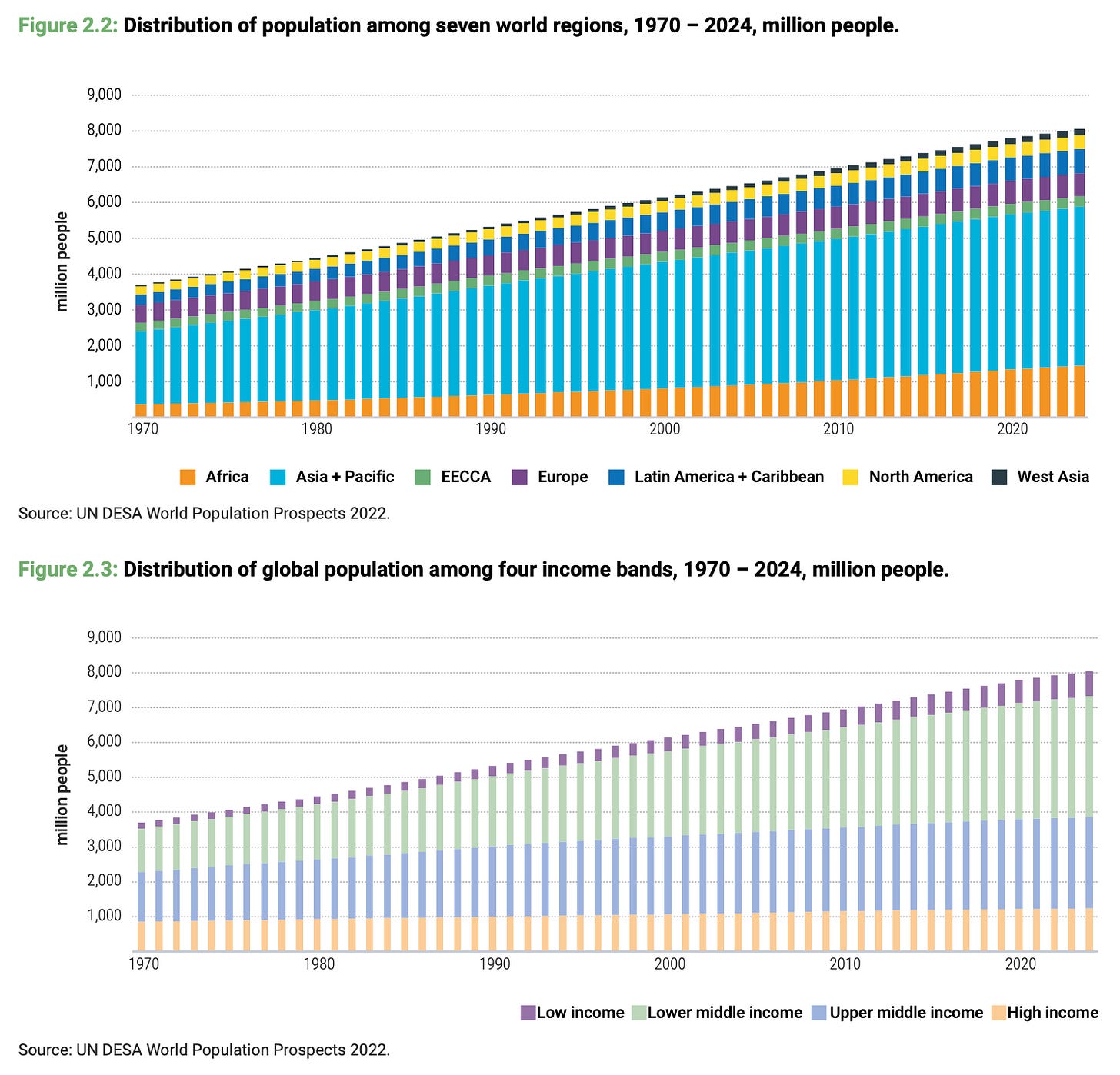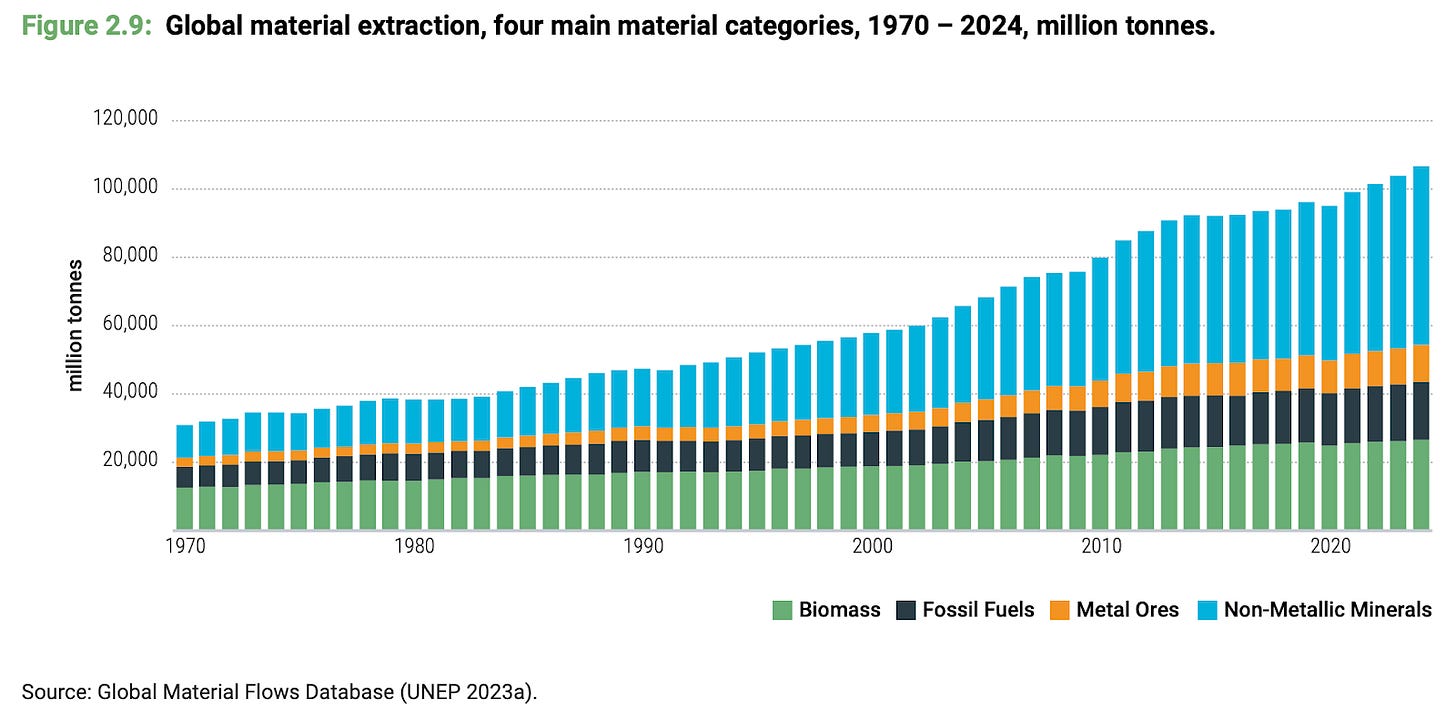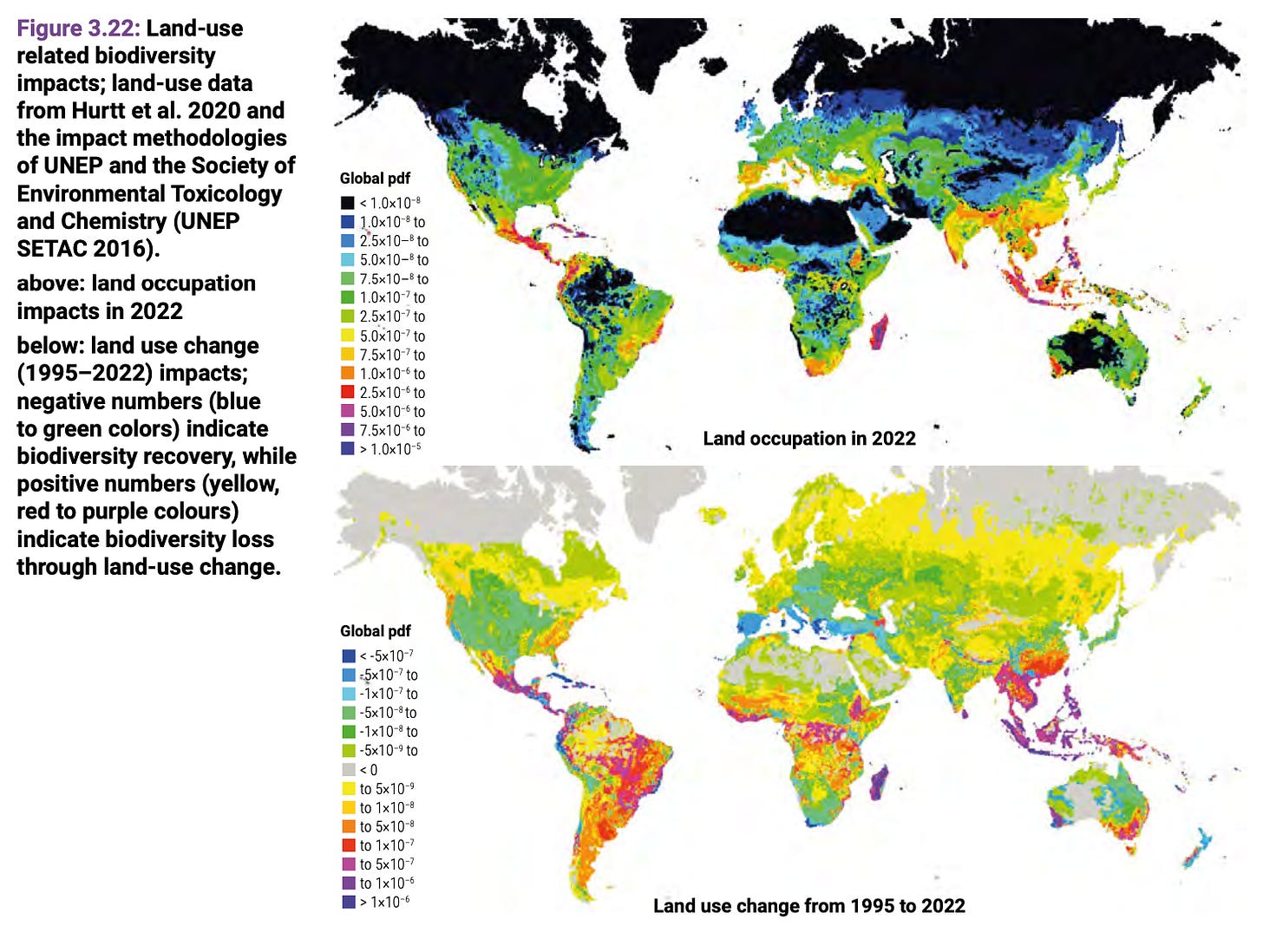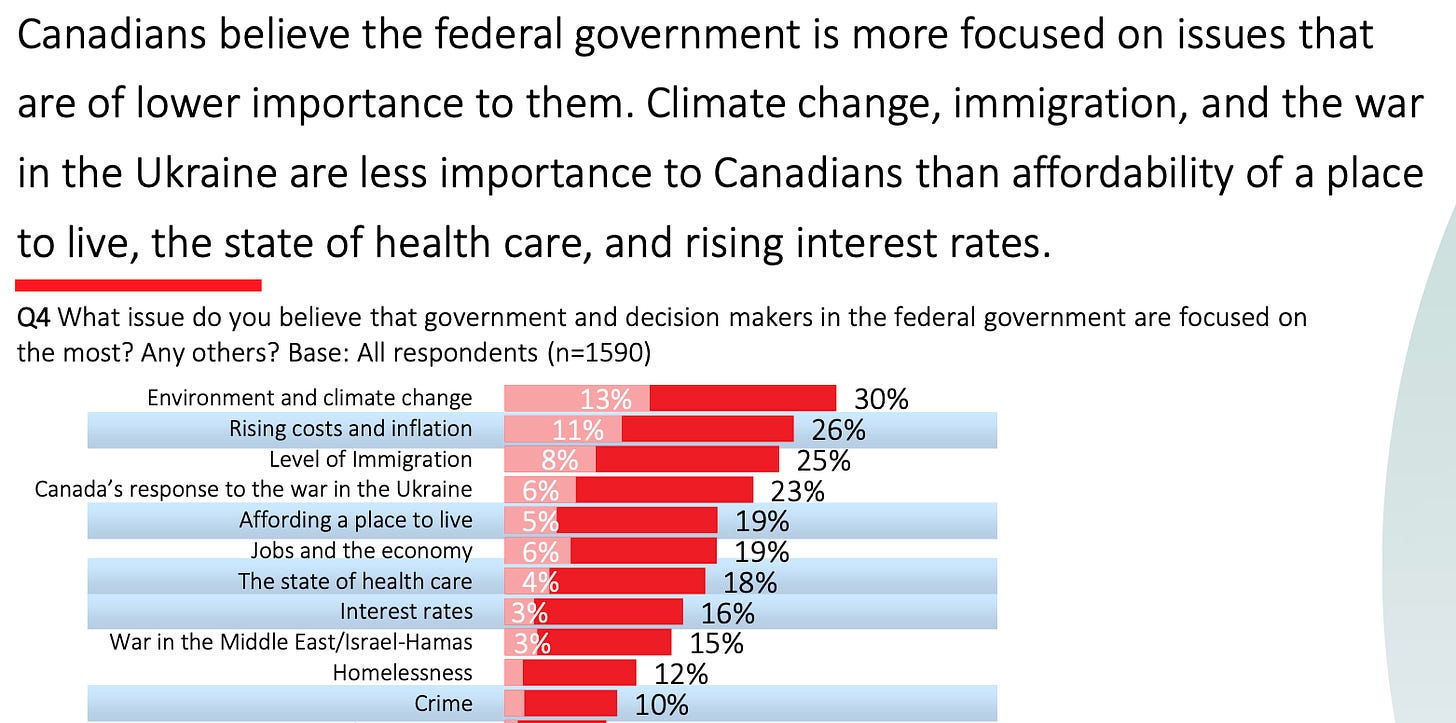Last Week in Collapse: March 3-9, 2024
This is Last Week in Collapse, a weekly newsletter compiling some of the most important, timely, useful, soul-crushing, ironic, stunning, or otherwise must-see/can’t-look-away moments in Collapse.
This is the 115th newsletter—and it’s a long one. You can find the February 25-March 2 edition here if you missed it last week. Thank you for subscribing to the Substack.
——————————
An international scientific body quashed an attempt to declare the Anthropocene to be its own epoch. Some scientists believe plants and animals may establish themselves on Antarctica after more melting has happened.
Fish supply off the coasts of Malaysia are so depleted—partly due to warm, oceanic bleaching—that fisherman have to go farther out to catch fish, into more dangerous waters, while fish stocks continue to sink. Around Japan, fish sizes are shrinking as global warming & overfishing place additional stresses on fish development. An Ocean Sustainability study on “No-Take” zones in the ocean—where governments forbid extraction of all resources—suggested that these zones would be useful in rebuilding fish stocks. However, such replenishment is not going to happen. In Canada, some ranchers are selling off their stock because Drought is limiting their carrying capacity.
Worsening Drought in Colombia. Water shortage in southern Spain. Türkiye’s largest soda lake (pH 9.7) has dropped in size dramatically because of evaporation and Drought. Drought caused agricultural disasters in Malawi and Zambia.
Wildfires in Indonesia, and elsewhere, have signaled an early start to a wildfire season that never really ended. The global sea surface temperature hit new anomalies, threatening more mass coral bleaching and dieoff events ahead.
A study from the European Geosciences Union predicted the water flows for when the permafrost melts, estimating that greater subsurface runoff will increase by about 15-30% by the end of this century. Subsurface runoff carries chemicals and carbon with it as it moves underground, impacting ecology and potentially the AMOC.
The [Global Resource Outlook 2024(https://phys.org/news/2024-03-rich-countries-resources-generate-climate.html) was released last week, and its 181 pages summarize a doompilled outlook on sustainability and our species’ incredible appetites. Total human resource consumption has more than tripled over the last 50 years. Our consumption is expanding with the growing middle class. Sustainable Development Goals are not being reached. 2.8 °C warming is expected by 2100. Construction, transportation, food, and energy are leading our materials consumption. The report has tons of great graphics and is worth skimming.
“The extraction of resources and processing for food, materials and fuels emitted many times more CO2 emissions than the target would allow for all human activities combined, and greatly exceeds targets for biodiversity loss.…Scientific assessments…confirm that the current model of natural resource use to deliver economic growth and social development is driving an unprecedented triple planetary crisis of climate change, biodiversity loss and pollution….Biomass growing and harvesting; mineral and fossil resource extraction; and processing of materials, fuels and food accounted for more than 55% of global greenhouse gas emissions in 2022….The largest net exporter of materials in 2020 was Australia followed by the Russian Federation, Brazil and Saudi Arabia….Climate change, urbanization, population changes and increasing average per capita income are expected to exert more pressure on scarce water resources….The triple planetary crisis of climate change, biodiversity loss and pollution increasingly threatens the future of society….Alleviating the environmental impacts of plastics needs both upstream and downstream solutions. Plastics contribute 4.5% of the global climate impacts, with fossil energy and feedstocks in production being the main drivers (particularly coal)....Key pressure indicators include resource extraction up around 60% from 2020 levels by 2060, primary energy up 50%, food and fibre biomass extraction up 80% and the area of agricultural land up 5%—displacing native habitat and increasing** biodiversity risks**….During the last five decades the Asia and the Pacific region has become the largest net importer of primary materials followed by Europe. All other world regions are net exporters—” -excerpts from the report
Greece is finishing its warmest winter on record, just months after its worst ever wildfire year. Earth has now seen 9 months of continuous record setting for global heat. In many parts of the United States, and in Morocco, the people never really saw cold temperatures this winter…
21,000 tonnes of fertilizer are threatening a “double pollution” event in the Red Sea. The now-sunken Rubymar cargo ship, which was already leaking oil, may soon release its chemical fertilizer into the fragile marine ecosystem, killing fish and coral, and potentially resulting in an algae bloom. Researchers also confirmed “that all organic soil components can break down more quickly in warmer conditions.”, according to a study in Nature Communications. A PhD thesis being assessed next week claims that iron has heretofore underexamined effects on the Arctic ecosystem and climate. Another Nature Communications study inspects the shifting wind currents over the Pacific Ocean, and how they might be impacting climate change.
Global warming is also responsible for cold snaps, say researchers…but these cold spells aren’t happening in the Arctic, where some scientists claim we could see our first ice-free Arctic summer—the Blue Ocean Event (BOE)—more than a decade earlier than others predict. Some are saying we could see it within two years, in a worst-case scenario. The full study has more details.
——————————
The U.S. government stopped mailing free COVID tests on Friday. A bizarre test of a German fellow, who had probably never gotten COVID before, got 210+ COVID vaccines (over a few years) to see how they would impact his health: he experienced neither immune system complications nor particularly strong protection. His T cell count was much higher, but his memory T cell count was about the same. More research on Long COVID confirms that “virus fragments” can remain in your blood for years after infection. Other research on COVID connects low iron supplies with worse COVID outcomes. There is still so much about this virus that we don’t know…
The controversial Collapse prophet John Michael Greer posted about the Collapse risk from Overshoot & population Collapse. A Calvin & Hobbes comic posted in the subreddit last week highlights the double standard we treat species populations with.
”very often the species reproduces so quickly that its population shoots up past the carrying capacity of the environment. This is called overshoot, and it has two consequences. The first is that once the peak is past, the population of the species tends to decline very quickly. The second is that once it is in overshoot, the species tends to damage the environment and reduce carrying capacity below what it would otherwise be….what it means is that population numbers drop steeply.” -from JMG’s post.
Tajikistan’s capital lost electricity for three hours due to a cold wave. Worldwide electricity demand is forecast to spike in the future as AI grows more capable and ubiquitous. The British government is being confronted with a necessary bailout for Thames Water, a massive utility company which services 16M Brits—and is £5B in debt. The IMF is warning that volatile commercial real estate loans in the United States could result in another financial crisis—and Jerome Powell believes some banks will fail from losses in this sector.
An American study tested 62 placentas, and determined that all of them had microplastics inside them. Microplastics are also being found inside clogged arteries, which can lead to death, heart attacks, strokes, and more. Some of you reading this may, one day, perish because of micro/nanoplastics.
The deterioration of plastics and other synthetic compounds will worsen in a warmer world, say scientists. These substances will leach into our soil and water, break down into micro/nanoplastics, and may prove impossible to remove. Scientists also say that tires are the leading cause of microplastics—78% of the total mass of microplastics…
A Canadian analytics company did a survey on whether Canada is currently broken; the 25-page report says yes. Specifically, the poll found that Canadians are much less concerned with environmental issues when compared to the economy, the cost of living, and the collapsing healthcare system.
South Korea is moving forward with an attempt to suspend the licenses of striking doctors. Scientists are still concerned about the potential for H5N1 to one-day make the jump to become human-to-human transmissible, maybe through mink farms. The Panama Canal continues struggling to meet its large water demands amid lasting Drought. The UK’s budget problems might hit their military spending hard, even as the world seems to re-arm for the Water Wars.
——————————
Filipino and Chinese vessels collided twice in the South China Sea, injuring several sailors and raising tensions. Pakistan’s government has cobbled together an 8-party coalition to reinstall an ex-PM, Shehbaz Sharif—the man who initially took over for the ousted ex-PM Imran Khan. In the United States, the Democratic and Republican frontrunners saw their last primary opponents withdraw after Super Tuesday, confirming a rematch of the 2020 election candidates.
Farmers protests continue across Europe, and may be gaining momentum. Meanwhile, drugs—and accompanying violence—are spreading across Europe.
North Korea is tightening its border with China. China is increasing its defence spending by 7.2% this year, and has removed its “peaceful reunification” claims regarding Taiwan, signaling a will to contest it by force.
Keep reading with a 7-day free trial
Subscribe to Last Week in Collapse to keep reading this post and get 7 days of free access to the full post archives.















